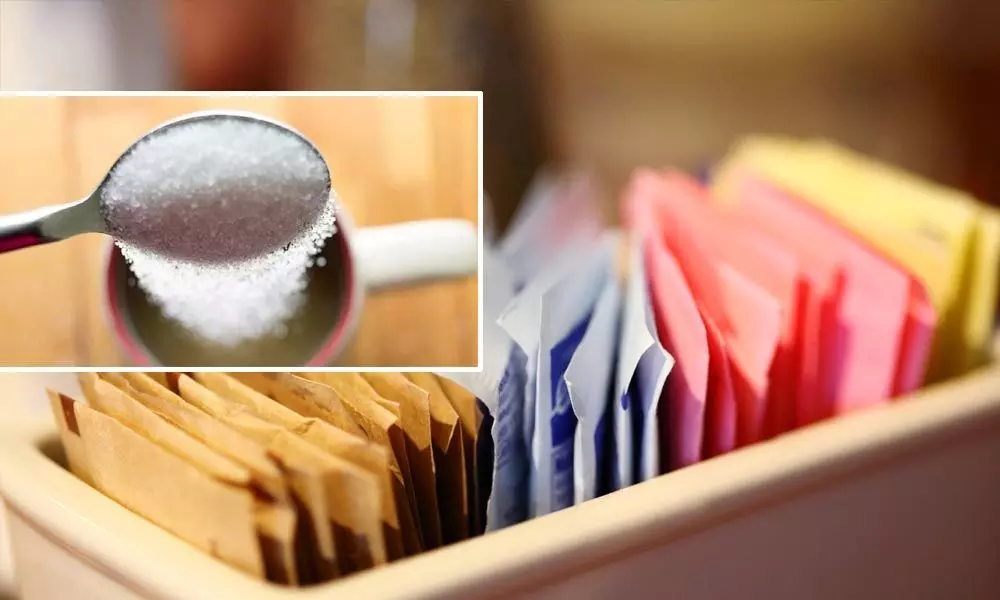Myths about Artificial Sweeteners - Are you using the right sugar substitute?

Couple of Years ago, we had three choices when it came to sweetening your tea or coffee: white sugar, brown sugar, or honey. But think, how times have changed.
Couple of Years ago, we had three choices when it came to sweetening your tea or coffee: white sugar, brown sugar, or honey. But think, how times have changed.
Today, with the great amount of attention given to calorie, sugar, and carbohydrate intake, many people do not even consider those options. Instead, numerous sugar substitutes are available, giving consumers the choice between the yellow packet (sucralose), blue packet (aspartame), or pink packet (saccharin). Many have a preference as to which best suits their taste buds and waistline. And now, in addition to those three choices, there's a relatively new calorie-free sugar substitute available: stevia served in a green packet.
What is the reason to Use Sugar Substitutes
There are three key benefits to surrendering some of the sugar in your diet:
1. Weight Loss
There are 774 calories in just a single cup of sugar. You might think that you don't consume much sugar, but most of us do actually intake a fairly large amount, according to statistics from the U.S. Department of Agriculture.
Just as with salt, adding sugar to foods and beverages becomes a habit. For example, you may stir it into your coffee and sprinkle it over your oatmeal or breakfast cereal in the morning. If you decide to make pudding "from scratch" for an after-dinner dessert, the directions call for two cups of sugar. Consuming too much sugar can undercut your weight loss efforts. However, if you substitute artificial sweetener for sugar, you can cut down on calories without eliminating your favourite foods from your diet.
2. Dental Care
One of the most common of all disorders, according to MedlinePlus, tooth decay occurs when the bacteria in your mouth converts foods – particularly sugar and starch – into acids. From cavities to tooth loss, the resulting problems can impact your appearance and your wallet. Sugar substitutes may reduce your need for professional dental care.
3. Health
Studies indicate that consuming too much sugar can increase your risk of heart disease. Researchers at UC Davis also caution that current U.S. dietary guidelines for daily sugar intake limitations may be set too high. Currently, the U.S. Department of Agriculture advises that women limit their sugar intake to 20 grams a day. Most of us consume more than five times that much!
Choosing the Right Sweetener
Thinking about swapping sugar for a zero- or low-calorie sweetener? Here's the scoop on sugar substitutes:
1. Aspartame (Equal)
The familiar blue packet in the sugar substitutes bowl usually contains aspartame. With no saccharin-like aftertaste, Equal has become one of the most popular sugar substitute brands. There are four calories per packet.
Advantages
It is 200 times sweeter than sugar and can be used to sweeten beverages and cereal.
It also can be used in some recipes that call for sugar.
Disadvantages
Because it loses its sweetness if you subject it to heat for a long time, aspartame is not ideal as a baking substitute.
Although the U.S. Food and Drug Administration considers it safe, those with the genetic disorder phenylketonuria (PKU) must avoid it.
Furthermore, WebMD reports that for those who suffer chronic headaches or migraines, aspartame can trigger these painful occurrences. It is recommended that you keep a food diary to see if you are sensitive to foods containing this sugar substitute.
Choosing Right Sweetener
2. Sucralose (Splenda)
Fond of the yellow packets to sweeten your tea? You're using sucralose, made popular by the Splenda brand. It's 600 times sweeter than sugar, and contains 0 calories per packet.
Advantages
Just as with Equal, there's no "saccharin" aftertaste, making it ideal for those with diabetes who want to satisfy their sweet tooth.
Although it can be used for baking, you may need to make some adjustments by referring to a conversion chart, as sucralose is more potent than sugar.
Disadvantages
Can you have too much of a good thing? In the case of sucralose, yes.
If you have a sensitive digestive system, you may suffer from gas, bloating, and diarrhoea if you consume too much.
In addition, there has been some debate about the fact that the sucralose molecule contains three atoms of chlorine, and whether that is safe for human consumption.
Sucralose Splenda Sweetener
3. Saccharin
If you go for the pink packets, you're a saccharin fan. The most popular brand is Sweet'N Low, which contains four calories per packet.
Advantages
This sweetener can be used in baking and cooking, as well as for sweetening beverages and cereal.
Disadvantages
The most common complaint about saccharin is its bitter aftertaste.
Saccharin is also categorized as a sulfonamide and can result in allergic reactions for those who cannot consume sulfa drugs.
Furthermore, it may pose health risks for the average consumer: During studies in the early 1970s on its safety, saccharin was linked with the development of bladder cancer. Consequently, food products containing saccharin bear the following warning label: "Use of this product may be hazardous to your health. This product contains saccharin, which has been determined to cause cancer in laboratory animals."
Saccharin Pin Packets
4. Stevia (Stevia In The Raw, Truvia)
Few coffee houses offer this option, which comes in the green packet and is commonly branded as Stevia Extract In The Raw or Truvia. However, using it at home has become an increasingly popular choice. It contains no calories.
Advantages
Stevia's taste lasts longer than sugar, and it can be used for baking and cooking. However, be sure to follow a conversion chart, as it may be advisable to replace sugar with half the amount of stevia extract when cooking.
Disadvantages
If you use extensive amounts to sweeten your food, such as plain yogurt, you can detect a bitter aftertaste.
In addition, stevia was initially banned in the United States because of research that showed it caused infertility and cancer in laboratory rats.
Stevia Green Packets
BRAIN REACTIONS TO REAL VS. ARTIFICIAL SUGARS
Although sometimes we cannot taste the difference between artificial and real sugars (despite the fact that they are actually very different), our brains and bodies can react to the differences. Our bodies can sometimes even detect very small differences between types of sugars and respond differently to each. Artificial sweeteners are highly concentrated—meaning that for the same physical amount, they can be between 200 to 13,000 times sweeter than sugar! Even though artificial sugars are sweeter than real ones, they are nearly calorie-free. In some studies, scientists have even found that people prefer the taste of artificial sugars over real ones. However, there is also data to suggest that there is greater brain activation in response to real sugar than to saccharin (a common artificial sugar), and this effect is particularly strong when people are hungry.
Our brains and bodies have different responses to artificial sweeteners and sugars because these substances are different from one another at the level of microscopic molecules. Reward pathways are like racetracks for neurons in our brains that when the excited result in the release of chemicals (such as dopamine, a common neurotransmitter) that make us feel good. Think of how good it feels to eat when you are hungry, or to have ice cream or cookies for dessert! Consuming sugar activates our reward pathways, which explains from a neurological perspective why we like the taste of it so much. Artificial sweeteners only partially activate reward pathways, as they are sweet (which we enjoy for pleasure), but do not have the calories that we need for energy. By not fully activating reward pathways, artificial sweeteners can be potentially harmful because they may, in a way, trick our brains, causing us to overeat in order to feel satisfied or to crave even more sweetness later on. After consuming artificial sweeteners, people experience less pleasure, which should decrease appetite, yet they tend to eat more and to choose foods that have a higher calorie count than people who consume nothing sweet, or those who consume real sugar [4]. Artificial sweeteners may make us crave real sugar even more, whereas cutting out sugars and artificial sweeteners from one's diet can lead to a decrease in sugar cravings in as little as 1 week
Final Word
In addition to these four common, popular sugar substitutes, a number of other sweeteners are available on the market. These artificial sweeteners include Sunett and Sweet One, which contain acesulfame potassium; NutraSweet, which contains aspartame; and SugarTwin, which contains saccharin in the United States (saccharin is banned in Canada), and cyclamates in Canada (cyclamates are banned in the U.S.).
What sugar substitute do you prefer? Do you avoid non-sugar sweeteners altogether?








